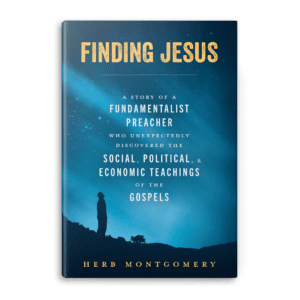
In this final of part of our discussion of a new iteration of our present world, let’s begin by discussing Jesus’ blessing on those who mourn. These are those to whom our present system brings the grief of loss. For those who mourn the way things are and things that have been taken from them, Jesus offers a new world especially for them.
Welcome Readers! Please subscribe to Social Jesus Here.
(Read this series from the beginning at Part 1 and Part 2.)
The contrast resonates with me. Our present system rewards those who are assertive, confident, bold, assured, and decisive. Those who are meek get trampled. Jesus calls us to reshape our systems so that the meek are centered and taken care of.
To hunger and thirst for righteousness, those things that are right, means to long for a world of distributive justice where privilege is replaced with egalitarianism and we value our differences rather than sustain a valuation system and hierarchy that disenfranchises some members of our community. To hunger and thirst for righteousness is to hunger and thirst for a world that is a just, safe, compassionate home for all of us, with space large enough for all the ways we are different from one another.
Those who are pure in heart are those who have not allowed the present system to change them. I think of the elderly war protestor who stood alone night after night in front of the White House with a single candle lit in protest of the Vietnam war. When asked if he really thought his little candle would change anything, he responded, “I don’t do this every night to change them, I do this so that they don’t change me.”
Peacemakers are quite different from peace keepers. People who prioritize keeping the peace are those who don’t want to rock the boat: don’t cause a scene; don’t cause a stir. Leave things the way they are. Keep the peace. Peace makers instead realize that genuine peace is arrived at through distributive justice for all: a society where “everyone will sit under their own vine and under their own fig tree, and no one will make them afraid” (Micah 4:4). Peace is the fruit of this kind of justice. This blessing is pronounced upon those who desire peace for everyone and who therefore work toward a justice that bears that fruit. They disrupt the present system. When confronted with their own inability to make the changes that are necessary, they make those who do have the ability uncomfortable until they make the changes. They are peace makers, not peace keepers.
Lastly, Jesus calls for a world where those presently persecuted, insulted, and lied about are instead, blessed. But persecution by itself is not a safe indicator that one is on the right path. If people do not like you, it might be because you are a jerk.
So social location matters here. You have to ask yourself, where are the insults or criticisms coming from? Are those who on the undersides and margins of our society against you while those at the top in more centered, privileged social locations singing your praises? Then your life story is in stark contrast with the Jesus story we read in the gospels.
Are you standing in solidarity with and working alongside those on the margins and undersides of your society while those at the top and more centered, privileged social locations insult you, lie about you, and say all kinds of evil things about you? If so, then you’re standing in the right story.
Those at the center of society might respond to you harshly if your work threatens their privilege. Those who are benefited by the present system don’t want things to change. To them, you are evil. So again, it’s not enough to have folks speaking poorly of you. You have to ask who is speaking and what their social location is in our present system.
This way of reading the Sermon on the Mount descriptively is deeply political, social, and economic. It asks us to consider who our present system prioritizes and who it harms. Then it calls us to stand in solidarity with all those being harmed, and work for a world that “blesses” them instead. This is what liberation theologians refer to as practicing a preferential option. Who does our present system harm? These are those the sermon on the mount calls us to practice a preferential option for while we work toward a different world.
Jesus’ words aren’t about leaving the status quo untouched and unchanged while we work on privatized, individual, spiritual virtues that give us a ticket to a postmortem heaven. These words are Jesus’ vision for a world here, now, today, where those presently being harmed are harmed no more. But even more so, it’s a world where those presently being harmed are given everything they need, not only to survive, but to thrive. A world where their value, worth and humanity are embraced and supported.
If you were to rewrite this sermon on the mount today, which people would yours include?
 Herb’s new book, Finding Jesus: A story of a fundamentalist preacher who unexpectedly discovered the social, political, and economic teachings of the Gospels, is now available at Renewed Heart Ministries.
Herb’s new book, Finding Jesus: A story of a fundamentalist preacher who unexpectedly discovered the social, political, and economic teachings of the Gospels, is now available at Renewed Heart Ministries.














